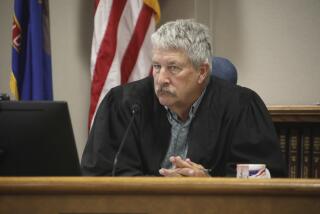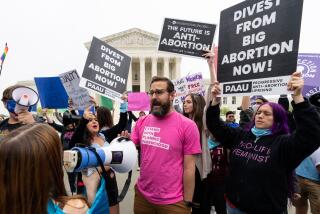Justices Sharply Question State on Abortion Fund Ban
SAN FRANCISCO — Justices on a state Court of Appeal panel Wednesday harshly questioned lawyers defending an anti-abortion provision inserted into the state budget by a clerical error, but signed by Gov. George Deukmejian.
The provision, authored by conservative Sen. H. L. Richardson (R-Glendora), seeks to cut off state money to any organization that “performs, promotes or advertises abortions.”
The appeal court in July issued an order barring the Administration from enforcing the provision. That order was due to expire Wednesday, but an hour and a half after the argument, the three-judge panel extended the order until the case is decided. It set no date for that decision.
Justice J. Anthony Kline opened the hearing by pointing out that the way in which the Richardson provision was passed violated the Legislature’s own rules, a comment echoed by Justice Jerome A. Smith, himself a former legislator.
In questioning the deputy attorney general responsible for defending the provision, Kline also noted that the provision was in conflict with another law, the Family Planning Act.
That act, also passed this legislative session, allocates $34 million this year to groups that counsel low-income people about a range of family planning options, including “pregnancy termination.”
“That is a euphemism for abortion,” Kline noted. He went on to say that the Richardson provision precluding abortion counseling is in “contradiction” to the Family Planning Act.
Deputy Atty. Gen. Ralph Johnson, while maintaining that the provision should be upheld, noted that the Department of Health Services planned to interpret it narrowly. Centers could continue to provide information about abortions, so long as they did not advocate abortions, he said.
Kline noted, however, that any clinic that urged a pregnant unmarried girl under age 15 to abort a pregnancy could lose its funding. Johnson agreed with that assessment.
Planned Parenthood attorney Jay-Allen Eisen pointed out that roughly 17 of the 170 family planning centers funded by the state would lose as much as $17 million in state money if the provision is allowed to go into effect.
Those 17 centers operate 150 abortion clinics, he said, adding that hospitals run by the University of California also would be affected because they too perform abortions.
Eisen argued that the provision violates First Amendment rights of free speech by threatening to cut off funds to any clinic where workers recommended an abortion.
The court seemed more concerned that the provision violated the section of the state Constitution that says that legislation cannot include more than a single subject. Eisen also had argued that the Richardson legislation violated that constitutional provision, since it affects abortions, but was inserted into the Budget Act, which is supposed to cover only state spending.
The controversy started when the abortion provision was mistakenly left in the final version of the state budget after legislators had agreed to delete it.
More to Read
Get the L.A. Times Politics newsletter
Deeply reported insights into legislation, politics and policy from Sacramento, Washington and beyond. In your inbox three times per week.
You may occasionally receive promotional content from the Los Angeles Times.










